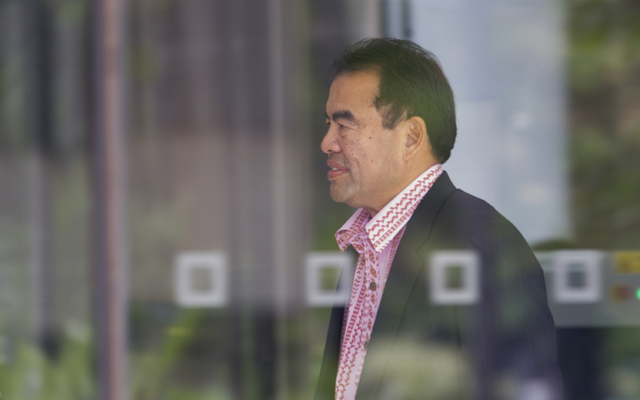Federal Judge Susan Oki Mollway delayed sentencing Honolulu telecommunications executive Albert Hee for a second time Tuesday, citing concerns about whether he would be able to get appropriate medical care for his food and environmental allergies in prison.
Hee’s attorney Michael Purpura testified that Hee suffers from severe allergies and that “any period of incarceration is life-threatening.” Hee also suffered a heart attack in 2011, according to his defense, making his medical condition more fragile.
Prosecutors have recommended that Hee be sentenced to between 41 and 51 months in prison for tax fraud. They say he siphoned about $4 million from his company Waimana Enterprises to cover “false” salaries to family members, college tuition for his children, family vacations, massages and dozens of other personal expenses.
Hee directed accountants and company employees to classify many of the personal expenses as business deductions or part of a shareholder loan that was never intended to be repaid, according to prosecutors.
Hee was convicted in July on six counts of filing false income tax returns and one count of corruptly impeding the IRS from correctly calculating and collecting his taxes.
The court set a new sentencing date for Jan. 6.
Last month Mollway delayed sentencing because she wanted more information about Hee’s medical conditions and more time to calculate the exact amount of the tax loss.
The prosecution pegged the tax loss at $431,793, which is important for determining how much Hee might have to repay the government as well as how long he could spend in prison.
On Tuesday Mollway concurred with the prosecution’s tax loss estimate over the objections of Hee’s attorneys, who said that the salary and benefits paid to Hee’s wife, a year of college tuition for one of his daughters and what Hee claims was a shareholder loan shouldn’t be calculated as part of the tax loss.
But Mollway was still uncomfortable with the information she was provided on Hee’s medical conditions.
Hee’s attorneys say he has food and environmental allergies that require him to take Benadryl daily, supplementing it with higher doses or injections of the medication if he’s having an allergic reaction. They say he also carries an EpiPen, which injects medicine into the body to treat anaphylaxis, and a device to puncture his windpipe in case of a severe reaction. Purpura said that Hee at times has to use the EpiPen but has not had to use the tracheal device.
A physician for the Federal Bureau of Prisons testified by phone that Hee could likely be provided with doses of Benadryl. He could also carry an EpiPen. The physician said that Hee, if sentenced to prison, could also be committed to a prison medical facility, where medical personnel are available at all times.
However, Mollway wanted more information — in particular, she wanted to know whether Hee could carry extra doses of Benadryl with him at all times, which could affect his sentence.
“I really wanted to finish this today,” said Mollway. “But it is really ridiculous for me not to have all the information that I need and to make a decision just because I’m inconveniencing you. I’m just not going to do that.”
Dozens of friends, family members, well-known political figures and business executives have submitted letters to Mollway urging her to be lenient in sentencing Hee, citing his years of community service, devotion to his family and the Native Hawaiian community, and good character.
Last month Mollway ordered those letters to be released to the public.
Subsequently, Mollway received a letter from Waianae High School teacher Trevor LaTorre-Couch saying his students have been following the coverage of Hee and are concerned about the equity of the justice system.
“They do not understand why Hee, who siphoned off funds for resources that belong to all of us, should be granted leniency,” wrote LaTorre-Couch. “They cannot comprehend why our state leaders — namely, a senator — would cite long-running friendships as valid reasoning to grant leniency. If they found themselves in violation of a law, could they count on the same high-ranking government officials to write letters of support? And if not, why? Finally, if the legal system is built for individuals like Hee — wealthy and well-connected — might it also be prejudiced against them — working-class, unprivileged, living below the poverty line?”

